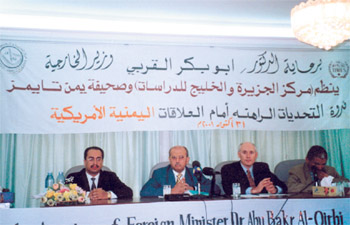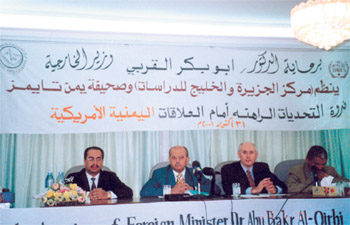
On the Sideline of ‘Challenges Facing Yemen-US Relations’ Seminar Participants: Yemen-US Relations Have Not Been Damaged [Archives:2001/46/Reportage]
November 12 2001
Hassan Al-Zaidy
Yemen Times
Countries relations with the US has since the September 11 attacks on New York and Washington become bound to the volume and the kind of cooperation these countries are ready to offer in the combat against terror.
The working papers presented during the one-day seminar on ‘Current Challenges Facing the Yemeni-US Relations’, hosted by the Yemen Times last week, showed how Yemen is important for the United States in its worldwide anti-terrorism campaign. Yemen’s Minister of Foreign Affairs, Dr. al-Qirbi, confirmed the fact that Yemen-US present relations are heavily revolving around fighting terrorism and emphasized that such cooperation would lead in the long run to a state of economic, as well as political security. He also expressed the Yemeni public’s concerns about mistakes made in the use of smart weapons that added more victims among Afghan citizens. He indicated their negative impact on the cooperation Arab and Islamic countries have been so far demonstrating towards the US. He described relations between the two countries as being based on cooperation, reason, understanding and transparency. “We appreciate the US cooperation with Yemen as a friend and a partner in facing the current challenges one of which is terrorism,” he said.
US ambassador to Yemen, Edmund J. Hull, pinpointed the idea that there could not be development without security and vice versa. He said there were Yemeni victims in the September 11 attacks.

Fighting terrorism was also one of the major topics discussed during president Saleh’s visit to the United States on April 4, 2000. America, as said a spokesman of its National Security Council, was working with Yemen on possibilities to fight terrorism in the region. “However, the USS Cole incident on October 12, 2000, confused all papers and motivated the US to exert pressure on Yemen to get as much facilities in the country as possible, disregarding the mutual interests and the negative impacts that do not serve security and stability of the region,” he added.
Highlighting the regional dimensions of the Yemeni-US relations, Mohammed al-Sabri, pointed out that Yemen has suffered losses as a result of acceptance of the American demands. He said that Yemen has been asked to break off relations with Iraq, a matter that was no easy task owing to the deep ties between both countries.
On the issue of terrorism, he said that cooperation between Yemen and the US began in 1989 to limit the so-called Marxist terrorism. In the mid 1990s, cooperation channels were shifted to fight religious extremism. Yemen decided to deport more than 14 thousand Afghans. Cooperation has been enhanced by a number of agreements between the two countries to fight terror and to train Yemeni anti-terrorism police, especially after the US started to realize the huge threat such groups impose on its interests in the region.
Al-Sabri concluded by saying that relations between the two countries have since the attack on the USS Cole at Aden Seaport turned to be focusing on cleansing the roots of terrorism. And about Yemen stance towards peace, al-Sabri said the country has two contradictory positions: a strict declared official one and an implemented stance that contradicts the official one. “This is a result of the US pressure, not of the political strategies of the our country,” he said.
The situation of the Yemeni community in the United States following the suicidal bombing of a number of targets in Washington and New York was the main point discussed by Muda’e Abdurabu Dayan, chairman of the al-Muhajer Research and Study Organization. He said that about 60 to 80 thousand Yemenis live in more than 20 states in the US and about 8 to 25 Yemenis were killed in the terrorist attacks on the two American cities. Hatred acts against Arabs and Muslims have caused death of about 6 Yemeni immigrants. But he insisted that “this has not affected the Yemeni-US good relations.”
Editor-in-Chief of the Yemen Times, Walid Abdulaziz al-Saqqaf, lectured on what Yemen has been offering the United States in connection to cooperating in the fight against terror and on what else America is demanding. He said that the latest incidents compelled Yemen to continue cooperation with the US in arresting and interrogating people suspected of having links with Bin Laden and his organization. He added that the Yemeni government had properly done what was required to be carried out. However, he said more cooperation was still needed in the light of the current circumstances.
Abdulghani Abdulqader listed a number of obstacles on the way of exemplary Yemeni-US relations. The imbalance in the stance of America towards the conflict in Palestine or American interference in other countries are some factors that Abdulghani believed to affect relations between the two countries.
Dr. Mohammed Abdulmajid al-Qubati talked about stability and security of the region as well as the future of the Yemen-US relation. He said that, despite the straining in Yemen-US relations caused by the USS Cole attack, the latest incidents in Washington and New York showed that Yemen was ready to offer any help in combating terrorism.
——
[archive-e:46-v:2001-y:2001-d:2001-11-12-p:./2001/iss46/report.htm]


